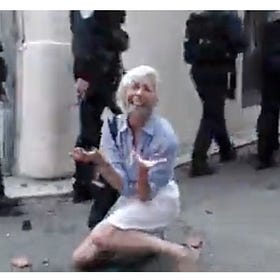Reflections on a gilded age
Transed and Nationless: The Post-Hitler West - Explaining the last three years as the diminishing cultural salience of the Holocaust, Pt 5.
Series notes
Comments on this series will be occasionally pruned for uninterestingness or evident failure to read and reply to the thesis itself. (Anything heavily centered on Jewish “machinations” in modern cultural and political affairs will probably merit removal on those grounds.)
Continued from part 1, which clarifies my position on Holocaust “Denialism” (I do not deny the Holocaust, but I insist that my understanding of what it was be based on normal historiographical standards, grounded in evidence and open to revisionism; anyone should do the same, the Holocaust should not be understood with a “special kind of history” the way children are given special scissors lest they harm themselves):
And parts 2-4, which reconstruct the history of American forgetting and recalling of the Holocaust, and serve to demonstrate the explicitly religious understanding of the Holocaust in the 1970s among both Jewish and non-Jewish white youth:
(Part 3 demonstrates in detail the forgetting; part 4 the recalling)
iii. Losing Our Religion: The Post-Hitler West
A thing apart from history
The previous segment, in making the case that the Holocaust conceptually functioned as a religion for the last half-century (for the white, secular American psyche in particular), examines the testimony of the earliest preachers and converts.
Here I would like in general, and also as another way of putting the collective understanding of the Holocaust in perspective, to emphasize that nowhere in this series have I argued that mainstream historical literature about the Holocaust needs to be thrown out as a bunch of nonsense. Quite the opposite: The works of Hilberg, Arendt, and Goldhagen all generated controversy at one point or another due to presenting the Holocaust in varying degrees of moral complexity and nuance (regardless of whether the respective essential narratives are correct, and regardless of whether the absence of alternate interpretations in academia is problematic).
When considering the “collective understanding” of the Holocaust, however, one is dealing with a thing completely removed from the base of academic literature, so much so that simply repeating mainstream historical facts and arguments can qualify as “Denialism” per the Wikipedia definition. This thing-completely-removed is what I have termed the “Comic-Book” version of the Holocaust. It is a “thing apart from history,” as details of history which reveal the moral complexity and defy the particularity of the Holocaust are both unimportant culturally, taboo socially, and punishable by the state, either civilly or criminally, if pointed out. Essentially, the ultimate crime is to make the Holocaust comprehensible in a practical sense as a proud and militant people trying to rid their land of another, with violent and hardly utopia-ushering results - who can really say why this is so.
The collective understanding of the Holocaust also meets Jacob Neusner’s quite useful definition of a “myth,” as a “story which tells the truth about how things are and how they came to be as they are; an account of the deepest meaning in the form of a tale or a narrative about sacred or holy events” - a definition which does not imply untruth, but demonstrably doesn’t assign any importance to truth (of the events of the story themselves).
And so, to add to the statements of the earliest Holocaust converts in the 70s, we may make the observation that the (“Comic-Book” version of the) Holocaust is a culturally dominant myth which mainstream academic writings openly complicate or contradict to varying degrees, protected by extreme social taboos, and which many Western states enforce arbitrarily (some transgressors and transgressions go unpunished; the citizen can never expect a consistent rule of law). Does this sort of regime sound familiar?
Reformation in the global West
The religious overtones of the Me Too Panic, Virus Panic, Race Panic, Cult of Vaccination, and now ascendant Cult of Trans have been remarked upon to exhaustion. Even setting that aside, it is clear that these successions of moral panics have generated particular ideologies and symbologies which have been embraced at least at times by the same organizations which police thought and speech regarding the Holocaust (e.g. churches, social media sites, governments), often with even greater vigor. I will not attempt to convince the reader that the Holocaust is losing its sanctity per se - I certainly wouldn’t advise anybody to “test the waters” publicly or privately, at this early date. Rather, it is sufficient to grant as axiomatic that these novel panics imply that sanctity, per se no longer renders the Holocaust sui generis in Western society and law. Many particular concepts have recently been deemed sacred in the West.
As a consequence, second-order beliefs and mores cultivated by the Holocaust myth must now compete for status with second-order beliefs cultivated by these novel panics, regardless of whether the Holocaust myth itself is still enforced absolutely. Therefor to whatever extent these second-order beliefs burden the Western cultural religion’s value-set with new contradictions, the Holocaust is potentially losing salience (if it is the case that it had been reinforcing the newly contradicted values).
All of this arguably applies to white, male, American self-esteem, and to the collective of mainstream American conservative values in the late 20th Century generally, as will be explored in the next (and presumably final) post.
The Holocaustianity Era in relief
But first, considering that the Holocaust’s national monopoly in the realm of sanctified myths spans from 1978 (the year of the ABC miniseries watched by 100 million Americans) to 2017 (“Me too”), we can observe interesting parallels, with no obvious causal inference suggested - something seems to drive these coincidental shifts, but each shift may simply reflect a shared outside driver rather than one of them being the driver.
The blockbuster era begins in 1975 with Jaws. Its “end” is harder to pinpoint, as one can really only argue that the term has by now become meaningless as even high-grossing movies cease to invoke a universal cultural currency of any sort. It is perhaps telling, however, that the Star Wars franchise (first released in 1977, and far more culturally indelible into the 80s than was Jaws) ceases being able to articulate a universal story to the Americanized West in 2017. Of course, this is a completely mysterious phenomenon that not even all the great thinkers of Earth put together could possibly discover the causes of.
Also overlapping partially with the Holocaustianity era is a “gilded age” in American racial and sexual politics, when overt civil rights reforms were subsumed either by ascendent conservatism or by token haranguing and lofty platitudes constrained by realpolitik, i.e. hypocrisy. Every president from Reagan to W. was in his own way an apt avatar for this era of America.
Inter alia the distinctive features of this era were homogenization, confidence, and hypocrisy, reflecting a compromised restoration of the preceding golden age’s conformity, anxiety, and legal apartheid. It was accepted by cultural elites that American society should vaguely and perpetually be “pursuing” the utopian notions of racial equality and tolerance invoked ad nauseam during the violent turmoil of the 60s, and that America the empire should refrain from military imperialism, but no social institutions were expected to actually meet any of these standards. Upon a very few rare cases it was necessary to make an example of those who were believed to have transgressed exceptionally, but the idea of actually purging whole institutions of pro-white, male, heterosexual biases were not entertained except where local demographic changes rendered such attempts politically appropriate (e.g. the Los Angeles police in 1990, though the reforms were hardly radical in design nor impressive in effect, and this as a result of the most notorious episode of “white-on-black racism” in the entire era under examination). Overall one may propose that in response to the failure of desegregation to improve race relations, America eventually simply accepted de facto inequality and moved on. Racism and sexism were real, and not good, but also things to joke about openly.
Anti-platitude humor flourishes in the late 1970s, as does anti-Christian humor. George Carlin’s first HBO special airs in 1977; his last months before his death in 2008. Carlin’s rejection of religion, like that of all late-20th Century performative atheists, is fundamentally sophistic, nihilistic, and reactionary. “Something is wrong here. War, disease, death, destruction, hunger, filth, poverty, torture, crime, corruption, and the Ice Capades” — as if religions were created as a response to the overwhelming good of man. The era when the Holocaust exerts a monopoly on sanctity not only creates the preconditions for such a confused understanding of religion, but leaves a place in the parlor of society for Carlin and other unreformed, jaded 1970s antiheroes. Perhaps this role is essential in a society built on hypocritical platitudes. Naturally, it has no place in one where the platitudes are taken seriously.
With the (now frankly impossible to believe) election of Obama, this entire status quo became immediately untenable in the United States, and perhaps also in Europe. “Conservatism” on the national scale had meant since the 1970s that leftist hypocritical platitudes were echoed on the right. With the realization of a Black president it was no longer possible for the left to simply not deliver on the platitudes of “pursuing” equality, for the old excuse had always been that such a pursuit wasn’t possible given white America’s residual backwardness and political hegemony. Therefor the only chance for retaining the status quo was for the right to immediately divest the same rhetorical interests, returning to the “radical” positions that were gaining a foothold in the 1960s, and we know that it did not do so.
The translation to Europe of Obama’s election and the progressive challenge articulated by James Murphy - “Three, we have a black president and you do not, so shut up” - is a matter I will not claim accurate perception of. But if first attaining a diverse polity is a prerequisite to the white “pursuit” of tolerance, Europe’s politicians have shown gusto in the last decade.
Next in the series:
The New, Improved Sacrifice Society
Series notes Comments on this series will be occasionally pruned for uninterestingness or evident failure to read and reply to the thesis itself. (Anything heavily centered on Jewish “machinations” in modern cultural and political affairs will probably merit removal on those grounds.)
Also:
Part 1: Introduction; RE Holocaust “Denialism” ↗
Part 2: Introduction to the forgetting and rediscovery of the Holocaust ↗
Part 3: 1945-1967: The forgetting of the Holocaust ↗
Part 4: 1967-1980: The recalling of the Holocaust ↗












Don't you think most of the waves of victimhood of different flavors are just the expression of one of the uglier sides of human nature? No one likes a whiny crybaby.
When I was a little kid in the late 50s early 60s, there was a horrible TV show called "Queen for a Day". My mother would be knitting while I played on the floor near her, and that show would sometimes air. The idea was, you had several sad-faced housewives in a row, and each one told her sob story. Then once the tear jerking was over, the voting took place. "Voting" was the dB level of applause for each individual. The loudest applause indicated the winner, who got some prize. Best of all, my mother would shake her head and laugh at it.
We seem to be stuck in "Queen for a Day" world. First we all got to feel sorry for blacks, en masse. Then, ok, everyone applauded the Jews because they went through "the Holocaust". That got tiresome so we had to go on the hunt for other tragedies and along with that, the perps and villains. The louder the press-applause, the more furrowed academic brows, the more shot you had at being the Winner at being a Big Loser.
Ok, so it's fashionable now to dump all over white men. I can't wait to see what happens when it's time for women to take their turn in the barrel. Maybe we can have a face-off of every Queen for a Day, you know, get them all into the ring and let them duke it out for the crown of Empress for a Day.
Thomas Sowell's recent, outstanding book "Black Rednecks and White Liberals" gets into some historiography of the portrayal of American whites as villains, American blacks as victims, Jews as victims, and Germans as evil to the man. I do worry though that he just walked into a fan.